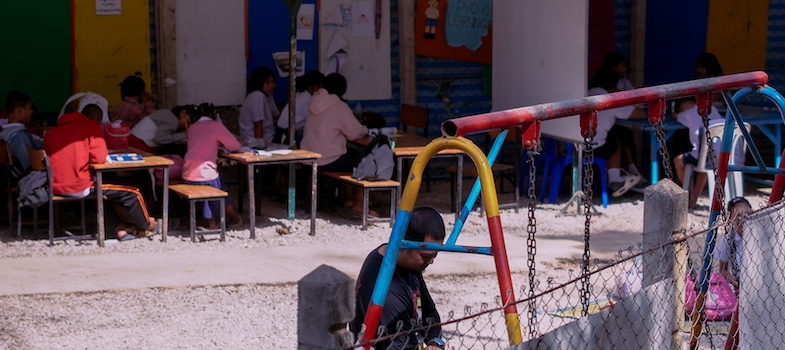3.4 Counselling in educational settings
As we have seen, children’s complex emotional responses to their experiences can sometimes impact their learning experiences. Providing counselling for children can help children to deal with difficult issues at school.
In this video, teacher Nway Nway Aung of the Marist Asia Foundation (MAF) tells us how counselling can help students who struggle at school. It can be helpful for everyone if the school is able to employ a counsellor to support students and teachers. However, in settings of conflict and displacement, where schools have limited resources, teachers often take on a counselling role themselves. This is the case at MAF.
You may recall the case study from Step 2.7 where two teachers met with a child who had an angry outburst during a class:
One incident happened during a computer class. The child left the classroom angrily after the teacher told students to follow classroom rules and concentrate on the lesson. The child felt he was being singled out and he was annoyed, so his reaction was to leave the room. This showed his impatience and difficulty managing his emotions.
To address this, the education manager and subject teacher had a discussion with the student. They spoke to him in a friendly manner, allowing him to express his feelings. He explained that he felt irritated by the teacher’s reminder to the class. Both the manager and the subject teacher explained to him that such reminders are a normal part of classroom management and not directed at him personally. They requested him to apologise to the teacher and his classmates. He did so willingly and happily.
While these teachers were not trained as counsellors, they worked together to listen to the child and help him express his feelings and find a solution.
It is important for all teachers to have some tools and techniques to help learners process their feelings so that they can respond appropriately when children and young people need emotional support. This is not the same as being a trained counsellor, but some basic strategies can help teachers respond to the immediate situation and work out what else might be needed to support the child or young person.
In this blog post, 9 Core Counselling Skills: Definition & Identification, the University Centre Peterborough in the UK summarises the core skills of counselling, which include:
- Active Listening: giving full attention to the person;
- Empathy and rapport building: understanding and sharing the person’s feelings to build trust;
- Non-verbal communication: responding to body language, facial expressions and tone of voice;
- Questioning techniques: using open-ended questions to encourage self-expression and closed questions for clarification;
- Reflection and summarising: re-stating things the person has said to encourage their self-reflection.
You might like to get together with your colleagues to find ways to access support or guidance to help develop these skills. If you know about useful resources or training opportunities, share these with colleagues. Find out if there are services available anywhere outside of your school to which you can refer learners.
Over to you
In the forum below, please share
- Do you think that offering counselling is part of a teacher’s role, or is it a specialist role?
- Are there any risks involved in offering this support to learners?
- Is this something that your school already provides or what further support or training would your school/learning centre need in order to be able to provide counselling support to learners?
© UCL and the Inclusive Education Foundation (CoMOOCs Team), CC BY 4.0
